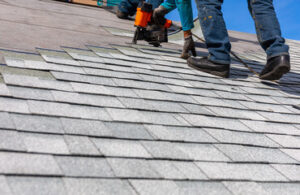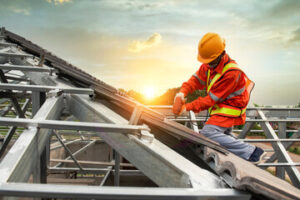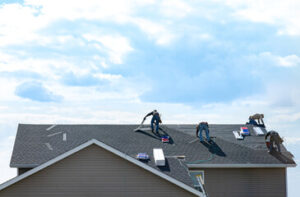Natural elements like rain, wind, snow and the sun wage an endless war against your roof. Repairing or replacing a damaged section enables you to avoid more costly problems down the road.

Localized damage – like one or two missing shingles – is usually easier to repair than widespread issues. And repairs that use a matching roofing material blend better with the rest of your original roof. Visit their Website for more information.
The cost of roof repair varies depending on the extent of damage and the materials used. Minor repairs, such as replacing a few loose or cracked shingles, typically have low costs. However, if your roof has extensive damage, such as widespread leaks or rotted wood, then the cost can rise dramatically. In some cases, it may be more cost-efficient to replace the entire roof than to repair it.
The age of the roof also influences the price. Older roofs are more likely to experience severe damage and need major repairs. The type of roof material also influences the cost, with slate and copper often costing more than asphalt shingles. Labor rates vary by region, with larger cities having higher labor costs than smaller towns. Roofing contractors also charge higher rates for emergency repairs and after-hours service.
Leaks near chimneys, vents, and skylights are common causes of water stains and leaks. Replacing the flashing around these areas can cost up to $1,500.
Having your roof inspected on a regular basis can help you identify problems before they become costly repairs. It’s important to have your roof inspected by a professional roofing contractor, as they can offer expert assessment and quality repairs.
Some common roofing problems include broken shingles, clogged gutters, and ice dams. If left untreated, these issues can lead to serious leaks and structural damage. It’s essential to have these issues fixed as soon as possible to prevent further damage.
It’s also a good idea to have your roof inspected after storms and hail, as these events can cause significant damage. Homeowner’s insurance often covers roof repair after natural disasters, so it’s worth checking your policy to see what coverage is available. In addition, it’s a good idea to have your roof repainted on a regular basis, as this can reduce the need for repairs in the future. You can also save money by having your roof repainted during the off-season when contractors are less busy. By taking advantage of these tips, you can lower your roofing repair costs without compromising on quality.
Materials
One of the most important factors in a roof repair project is the materials used. There are many different roofing materials to choose from, and each has its strengths and weaknesses. Certain materials are better for certain climate conditions and withstand damage better than others. Choosing the right materials for a repair job is essential to ensure longevity of the repairs.
The type of roofing material will also affect repair costs. Asphalt shingles are inexpensive and easy to install, while metal roofs require more materials and specialized skills to repair. Tile roofing is more expensive but offers superior durability and energy-efficiency. If you’re planning on selling your home soon, new roofs with durable materials increase resale value.
In addition to the cost of materials, labor is another key factor in a roof repair project. It’s important to hire a professional who has experience working on a variety of roofing types and can work efficiently to minimize downtime. In addition, it’s important to follow proper safety guidelines when repairing a roof. Failure to do so can lead to injuries and property damage.
While a minor leak may seem insignificant at first, it’s crucial to address the issue quickly to prevent it from growing into a major problem. The first step is to locate the source of the leak and clean the area. This will remove any dirt or debris and make it easier to patch the leak. Next, apply a waterproof roofing sealant to the affected area and secure any loose shingles. Finally, if the roof is leaking in several places, consider using a waterproof membrane to cover the entire surface of the roof.
For a quick and easy solution, you can use a leak diverter. This product is available in a range of sizes and colors, and it’s suitable for all roof types. It uses a rubber mixture to seal leaks and is easy to install. It works in a wide temperature range and won’t crack or shrink.
Warranty
When choosing a roofing contractor, it’s important to choose one who offers a warranty for their services. This will help protect homeowners from unexpected repair costs in the future. A quality roof warranty can also add value to a home and make it more appealing to potential buyers. However, it’s crucial to review the terms and conditions of the warranty carefully before deciding whether or not it’s right for you.
There are several types of roof repair warranties available for homeowners, including manufacturer and workmanship warranties. A manufacturer warranty covers defects in roofing materials, such as shingles, and typically lasts for 20 to 50 years. A contractor’s workmanship warranty covers installation errors, and it usually lasts for 1 to 10 years. Many manufacturers offer comprehensive warranty packages that combine both a manufacturer and contractor’s workmanship warranties. These warranties may provide additional benefits and longer coverage periods than individual warranties.
A good homeowner’s insurance policy will usually cover roof damage caused by hail, wind, and other natural disasters. In addition, it will typically cover the cost of replacing a damaged roof or the associated interior repairs. It’s important to keep in mind, however, that most insurance policies have deductibles and exclusions that must be met before a claim is paid.
Homeowners can minimize the likelihood of costly repair bills by regularly performing routine maintenance on their roofs. This includes checking for signs of leaks and maintaining a record of maintenance and repairs. In addition, it’s important to have a professional roofer perform inspections and maintenance on a regular basis.
A homeowner’s warranty may exclude damage caused by storms, earthquakes, or other acts of nature. It may also exclude normal wear and tear, which is caused by exposure to the elements over time. Homeowners can maximize the benefit of their warranties by properly maintaining their roofs and by keeping detailed records of maintenance and repairs.
A manufacturer’s warranty may be prorated, or it may provide full coverage for the duration of the warranty period. Some manufacturers offer a transferable warranty, which allows homeowners to transfer their warranty to a new owner if they sell their home during the warranty period.

